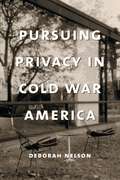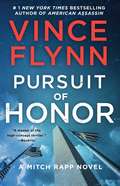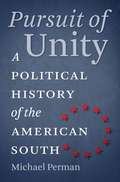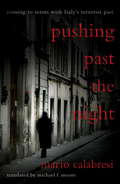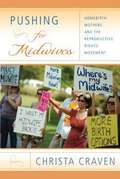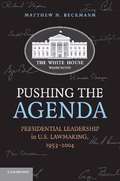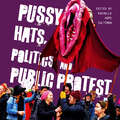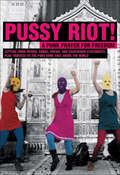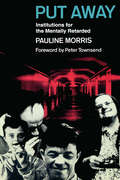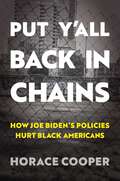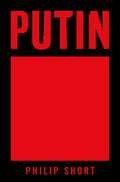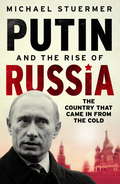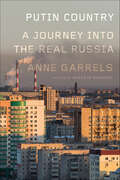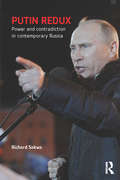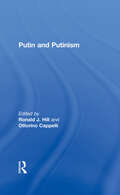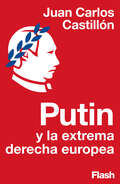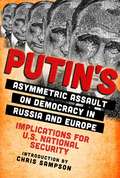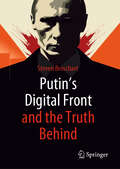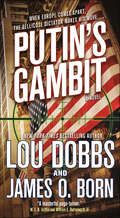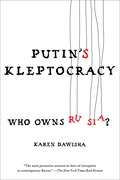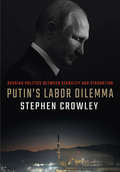- Table View
- List View
Pursuing Privacy in Cold War America (Gender and Culture Series)
by Deborah NelsonPursuing Privacy in Cold War America explores the relationship between confessional poetry and constitutional privacy doctrine, both of which emerged at the end of the 1950s. While the public declarations of the Supreme Court and the private declamations of the lyric poet may seem unrelated, both express the upheavals in American notions of privacy that marked the Cold War era. Nelson situates the poetry and legal decisions as part of a far wider anxiety about privacy that erupted across the social, cultural, and political spectrum during this period. She explores the panic over the "death of privacy" aroused by broad changes in postwar culture: the growth of suburbia, the advent of television, the popularity of psychoanalysis, the arrival of computer databases, and the spectacles of confession associated with McCarthyism.Examining this interchange between poetry and law at its most intense moments of reflection in the 1960s, '70s, and '80s, Deborah Nelson produces a rhetorical analysis of a privacy concept integral to postwar America's self-definition and to bedrock contradictions in Cold War ideology. Nelson argues that the desire to stabilize privacy in a constitutional right and the movement toward confession in postwar American poetry were not simply manifestations of the anxiety about privacy. Supreme Court justices and confessional poets such as Anne Sexton, Robert Lowell, W. D. Snodgrass, and Sylvia Plath were redefining the nature of privacy itself. Close reading of the poetry alongside the Supreme Court's shifting definitions of privacy in landmark decisions reveals a broader and deeper cultural metaphor at work.
Pursuing Privacy in Cold War America (Gender and Culture Series)
by Deborah NelsonPursuing Privacy in Cold War America explores the relationship between confessional poetry and constitutional privacy doctrine, both of which emerged at the end of the 1950s. While the public declarations of the Supreme Court and the private declamations of the lyric poet may seem unrelated, both express the upheavals in American notions of privacy that marked the Cold War era. Nelson situates the poetry and legal decisions as part of a far wider anxiety about privacy that erupted across the social, cultural, and political spectrum during this period. She explores the panic over the "death of privacy" aroused by broad changes in postwar culture: the growth of suburbia, the advent of television, the popularity of psychoanalysis, the arrival of computer databases, and the spectacles of confession associated with McCarthyism.Examining this interchange between poetry and law at its most intense moments of reflection in the 1960s, '70s, and '80s, Deborah Nelson produces a rhetorical analysis of a privacy concept integral to postwar America's self-definition and to bedrock contradictions in Cold War ideology. Nelson argues that the desire to stabilize privacy in a constitutional right and the movement toward confession in postwar American poetry were not simply manifestations of the anxiety about privacy. Supreme Court justices and confessional poets such as Anne Sexton, Robert Lowell, W. D. Snodgrass, and Sylvia Plath were redefining the nature of privacy itself. Close reading of the poetry alongside the Supreme Court's shifting definitions of privacy in landmark decisions reveals a broader and deeper cultural metaphor at work.
Pursuit of Honor: A Novel (A Mitch Rapp Novel #12)
by Vince FlynnMitch Rapp—the &“mainstay of the modern techno-thriller&” (New York Journal of Books)—returns in this exhilarating political thriller as he fights for the sake of his country and the pursuit of honor.Less than a week after a series of deadly explosions devastated Washington, DC, key officials are up in arms over whether to make friends or foes of the clandestine elite counterterrorism operatives that stepped between the enemy and countless American lives. Not for the first time, Mitch Rapp finds himself struggling to illustrate the realities of national security to politicians who are content to sit on the sidelines. Meanwhile, three al-Qaeda terrorists are still at large, and Rapp has been unofficially ordered to find them by any means necessary. No one knows the personal, physical, and emotional sacrifices required of the job better than Rapp. When he sees his colleague Mike Nash cracking under the pressure, he makes a call he hopes will save his friend, assuage the naysayers on Capitol Hill, and get him one step closer to the enemy before it&’s too late. Once again, Rapp proves himself to be a hero unafraid &“to walk the fine line between the moral high ground and violence&” (The Salt Lake Tribune) for our country&’s safety and for the pursuit of honor.
Pursuit of Unity
by Michael PermanIn Pursuit of Unity, Michael Perman presents a comprehensive analysis of the South's political history. In the 1800s, the region endured almost continuous political crisis--nullification, secession, Reconstruction, the Populist revolt, and disfranchisement. For most of the twentieth century, the region was dominated by a one-party system, the "Solid South," that ensured both political unity internally and political influence in Washington. But in both centuries, the South suffered from the noncompetitive, one-party politics that differentiated it from the rest of the country. Since the passage of the Voting Rights Act in 1965, Perman argues, the South's political distinctiveness has come to an end, as has its pursuit of unity.
Pushing Past the Night
by Michael Moore Mario Calabresi Roger CohenDecember 15, 1969, was the most important day of Mario Calabresi's life, although he would not be born for another year. On that date, the anarchist Giuseppe Pinelli fell to his death from a window at the Milan police headquarters, where he was being questioned about his role in the Piazza Fontana massacre, the most infamous episode of domestic terrorism in Italy.Police Inspector Luigi Calabresi, Mario's father, was in the building, though not in the room, at the time of the accident. This didn't stop the rumors that Pinelli had been killed by Calabresi. These suspicions kicked off "a ferocious lynching, albeit in slow motion"--as the Italian paper La Repubblica characterized it--that culminated in the murder of Luigi Calabresi outside his home one morning in 1972. Calabresi left behind his pregnant wife and two young sons.In this memoir, Mario Calabresi explores the personal and political fallout of Italy's era of domestic terrorism in a poignant and very personal account. His grief at the murder of his father is balanced by a desire to overcome the divisions that still scar Italy today. This powerful book calls not only for accountability but also for redemption. As Mario Calabresi's mother always told him, you have to look to the future, stake your bets on life, and refuse to be a prisoner of hatred.
Pushing Past the Night: Coming to Terms with Italy's Terrorist Past
by Mario CalabresiDecember 15, 1969, was the most important day of Mario Calabresi's life, although he would not be born for another year. On that date, the anarchist Giuseppe Pinelli fell to his death from a window at the Milan police headquarters, where he was being questioned about his role in the Piazza Fontana massacre, the most infamous episode of domestic terrorism in Italy. Police Inspector Luigi Calabresi, Mario's father, was in the building, though not in the room, at the time of the accident. This didn't stop the rumors that Pinelli had been killed by Calabresi. These suspicions kicked off "a ferocious lynching, albeit in slow motion"-as the Italian paperLa Repubblicacharacterized it-that culminated in the murder of Luigi Calabresi outside his home one morning in 1972. Calabresi left behind his pregnant wife and two young sons. In this memoir, Mario Calabresi explores the personal and political fallout of Italy's era of domestic terrorism in a poignant and very personal account. His grief at the murder of his father is balanced by a desire to overcome the divisions that still scar Italy today. This powerful book calls not only for accountability but also for redemption. As Mario Calabresi's mother always told him, you have to look to the future, stake your bets on life, and refuse to be a prisoner of hatred.
Pushing for Midwives: Homebirth Mothers and the Reproductive Rights Movement
by Christa CravenWith the increasing demand for midwives, activists are lobbying to loosen restrictions that deny legal access to homebirth options. In Pushing for Midwives, Christa Craven presents a nuanced history of women’s reproductive rights activism in the U. S. She also provides an examination of contemporary organizing strategies for reproductive rights in an era increasingly driven by “consumer rights. ” An historical and ethnographic case study of grassroots organizing, Pushing for Midwives is an in-depth look at the strategies, successes, and challenges facing midwifery activists in Virginia. Craven examines how decades-old race and class prejudices against midwives continue to impact opposition to-as well as divisions within-women’s contemporary legislative efforts for midwives. By placing the midwifery struggle within a broader reproductive rights context, Pushing for Midwives encourages activists to reconsider how certain political strategies have the potential to divide women. This reflection is crucial in the wake of neoliberal political-economic shifts that have prioritized the rights of consumers over those of citizens-particularly if activists hope to maintain their commitment to expanding reproductive rights for all women.
Pushing the Agenda
by Matthew N. BeckmannToday's presidents enter office having campaigned on an ambitious policy agenda, eager to see it enacted, and willing to push so that it is. The central question of presidents' legislative leadership, therefore, is not a question of resolve, it is a question of strategy: by what means can presidents build winning coalitions for their agenda? Pushing the Agenda uncovers the answer. It reveals the predictable nature of presidents' policy making opportunities and the systematic strategies White House officials employ to exploit those opportunities. Drawing on an eclectic array of original evidence - spanning presidents from Dwight Eisenhower to George W. Bush and issues ranging from education to energy, and healthcare to taxes - Matthew N. Beckmann finds modern presidents' influence in Congress is real, often substantial, and - to date - largely underestimated.
Pussy Hats, Politics, and Public Protest
by Rachelle Hope SaltzmanCo-winner of the 2021 Elli Köngäs-Maranda Prize awarded by the Women's Section of the American Folklore SocietyContributions by Susan Eleuterio, Andrea Glass, Rachelle Hope Saltzman, Jack Santino, Patricia E. Sawin, and Adam Zolkover The 2016 US presidential campaign and its aftermath provoked an array of protests notable for their use of humor, puns, memes, and graphic language. During the campaign, a video surfaced of then-candidate Donald Trump’s lewd use of the word “pussy”; in response, many women have made the issue and the term central to the public debate about women’s bodies and their political, social, and economic rights. Focusing on the women-centered aspects of the protests that started with the 2017 Women’s March, Pussy Hats, Politics, and Public Protest deals with the very public nature of that surprising, grassroots spectacle and explores the relationship between the personal and the political in the protests. Contributors to this edited collection use a folkloristic lens to engage with the signs, memes, handmade pussy hats, and other items of material culture that proliferated during the march and in subsequent public protests. Contributors explore how this march and others throughout history have employed the social critique functions and features of carnival to stage public protests; how different generations interacted and acted in the march; how perspectives on inclusion and citizenship influenced and motivated participation; how women-owned businesses and their dedicated patrons interacted with the election, the march, and subsequent protests; how popular belief affects actions and reactions, regardless of some objective notion of truth; and how traditionally female crafts and gifting behavior strengthened and united those involved in the march.
Pussy Riot!: A Punk Prayer for Freedom
by Pussy RiotLetters from prison, songs, poems, and courtroom statements, plus tributes to the Russian punk band that shook the world.On February 21, 2012, five members of a Russian feminist punk collective Pussy Riot staged a performance in the Cathedral of Christ the Savior in Moscow. Dressed in brightly colored tights and balaclavas, they performed their “Punk Prayer” asking the Virgin Mary to drive out Russian president Vladimir Putin from the church. After just forty seconds, they were chased out by security. Once a retooled video of the events circulated on YouTube (edited to seem much longer than the actual performance), the state was riled into action. Three members of the collective, Maria Alyokhina, Nadezhda Tolokonnikova, and Yekaterina Samutsevich, known as Masha, Nadya, and Katya, were arrested and charged with felony hooliganism motivated by religious hatred, an offense carrying a sentence of up to seven years.As their trial unfolded, these young women became global feminist icons, garnering the attention and support of activists and artists around the world, including Madonna, Paul McCartney, and Sting, as well as contributors to this book: Yoko Ono, Johanna Fateman, Karen Finley, Justin Vivian Bond, Eileen Myles, and JD Samson. The Internet exploded with petitions, music videos, and calls to action, and as the guilty verdict was anticipated, Pussy Riot responded with articulate, unwavering courtroom statements, calling for freedom of expression, an end to economic and gender oppression, and a separation of church and state. They were sentenced to two years in prison, and inspired a global movement. Collected here are the words that roused the world.
Put Away: Institutions for the Mentally Retarded (International Library Of Sociology Ser.)
by Pauline MorrisThis classic book allows its readers for the first time to comprehend the size, organization, staffing and operation of a national system of hospitals and residential services for the subnormal. It also allows for the first time, reliable estimates to be given of the scale and severity of certain problems. The basis has been laid for an evaluation of the effectiveness of hospitals for the subnormal. All this has been made possible by a generous grant from the National Society for Mentally Handicapped Children to the Department of Sociology in the University of Essex upon the foundation of the University. Of course, a great deal of further research remains to be done but a preliminary network of information is now available to all those deeply concerned about the handicapped.This is a study of the range and quality of institutional provisions made in England and Wales for that group of handicapped individuals who are known as mentally deficient. Dr. Morris reports on an investigation, which covered nearly half the hospitals for the sub-normal in the country: many of its findings can only shock and dismay.The investigation was concerned to discover what facilities-physical, occupational and educational-there was for patients, and to learn more about their social environment. It was also concerned to determine the extent to which both staff and patients are affected by their social environment, and by administrative action, and to learn something of the relationship between the hospital as an institution and the outside community, as well as between the patients and the outside world. In addition, it examined the extent to which the provisions and facilities available met the needs of the patients in relation to their physical and mental handicaps.
Put Y'all Back in Chains: How Joe Biden's Policies Hurt Black Americans
by Horace CooperPut Y&’all Back in Chains outlines how the policies of President Joe Biden harm Black communities and limit opportunities for their success.&“Whether you agree or disagree, Horace Cooper&’s latest book tackles the question of how Joe Biden&’s policies affect Americans, especially those in minority and underserved communities. His research shows that the injuries are calamitous. Instead of a rising tide lifting all boats, the Biden policies are having a reverse effect, one that devastates bank accounts, crushes entrepreneurship, and steals the promise of the American Dream. Horace painstakingly combs through the harsh results of these efforts, especially on lower income and working class people, who are hit hardest by the woke-policies of Joe Biden. If you want to see the real story the media isn&’t telling, this book is a must read!&” –Sean Hannity, Fox News Host A thorough examination of the ways that the policies of President Joe Biden are antithetical to the aspirations and dreams of Blacks, Put Y&’all Back in Chains uncovers the reasons that the policies of the Biden Administration hurt Black communities in particular. And this is no accident. Progressive policymakers relished Biden&’s COVID-19 pandemic restrictions, his experiments with higher unemployment benefits and related regulatory programs, and especially his push for the green agenda. Consequently, working-class people, especially Black men, were hardest hit when it comes to finding employment as well as maintaining their financial lifestyle. Tragically, the Biden Agenda hurt the entire Black community, affecting educational attainment, wealth creation, and homeownership. These dramatic downward changes were particularly hard to absorb for Black households, especially those that made tremendous gains during the Trump Administration. It is increasingly clear that President Joe Biden&’s priorities place Blacks at the back of the political bus. In this thoroughly researched book, Horace Cooper outlines how the minority group most likely to support Biden—Blacks—are systematically impaired by this White House and why the Black community needs to turn away from the Biden Administration and toward a brighter future.
Putin
by Philip ShortThe first comprehensive, fully up-to-date biography of Vladimir Putin, woven into the tumultuous saga of Russia over the last sixty years Vladimir Putin is the world’s most dangerous man. Alone among world leaders, he has the power to reduce the United States and Europe to ashes in a nuclear firestorm and has threatened to do so. He invades his neighbors, most recently Ukraine, meddles in western elections, and orders assassinations inside and outside Russia. His regime is autocratic and deeply corrupt. But that is only half the story.Unflinching, hard-hitting, and objective, Philip Short’s biography gives us the whole tale, up to the present day. To the fullest extent anyone has yet been able, Short cracks open the strongman’s thick carapace to reveal the man underneath those bare-chested horseback rides. In this deeply researched account, readers meet the Putin who slept in the same room as his parents until he was twenty-five years old, who backed out of his wedding right beforehand, and who learned English in order to be able to talk to George W. Bush.Vladimir Putin is wreaking havoc in Europe, threatening global peace and stability and exposing his fellow citizens to devastating economic countermeasures. Yet puzzlingly many Russians continue to support him. This book is essential reading for anyone who wants to understand the many facets of the man behind the mask that Putin wears on the world stage.Drawing on almost two hundred interviews conducted over eight years in Russia, the United States, and Europe and on source material in more than a dozen languages, Putin will be the last word for years to come.
Putin And The Rise Of Russia: The Country That Came In From The Cold
by Michael StuermerA brilliant analysis of Putin and the key role a resurgent Russia has to play in world affairs.When the Soviet Union collapsed, the world was left wondering about its destiny. Russia is still an enormous power with a population exceeding 140 million, immense military resources and giant energy reserves - in short, a vast land full of promise and opportunity.Russia has the potential to be a force of stability or a force of turmoil, but when it comes to global affairs, can she be persuaded to join the world order? Will yesterday's revolutionary power become tomorrow's stabilizer?Professor Stuermer's authoritative and timely account considers a Russia going through a defining phase after the departure of Vladimir Putin. History is on the move: we face an open and challenging future in which Russia, for better or for worse, will play a key role.
Putin And The Rise Of Russia: The Country That Came In From The Cold
by Michael StuermerA brilliant analysis of Putin and the key role a resurgent Russia has to play in world affairs.When the Soviet Union collapsed, the world was left wondering about its destiny. Russia is still an enormous power with a population exceeding 140 million, immense military resources and giant energy reserves - in short, a vast land full of promise and opportunity.Russia has the potential to be a force of stability or a force of turmoil, but when it comes to global affairs, can she be persuaded to join the world order? Will yesterday's revolutionary power become tomorrow's stabilizer?Professor Stuermer's authoritative and timely account considers a Russia going through a defining phase after the departure of Vladimir Putin. History is on the move: we face an open and challenging future in which Russia, for better or for worse, will play a key role.
Putin Country: A Journey into the Real Russia
by Anne GarrelsShort-listed for the Pushkin House Russian Book PrizeFrom the award-winning author of Naked in Baghdad comes Anne Garrels's revealing look into the lives of ordinary Russians, Putin Country. More than twenty years ago, the NPR correspondent Anne Garrels first visited Chelyabinsk, a gritty military-industrial center a thousand miles east of Moscow. The longtime home of the Soviet nuclear program, the Chelyabinsk region contained beautiful lakes, shuttered factories, mysterious closed cities, and some of the most polluted places on earth. Garrels’s goal was to chart the aftershocks of the U.S.S.R.’s collapse by traveling to Russia’s heartland.Returning again and again, Garrels found that the area’s new freedoms and opportunities were exciting but also traumatic. As the economic collapse of the early 1990s abated, the city of Chelyabinsk became richer and more cosmopolitan, even as official corruption and intolerance for minorities grew more entrenched. Sushi restaurants proliferated; so did shakedowns. In the neighboring countryside, villages crumbled into the ground. Far from the glitz of Moscow, the people of Chelyabinsk were working out their country’s destiny, person by person. In Putin Country, Garrels crafts an intimate portrait of Middle Russia. We meet upwardly mobile professionals, impassioned activists who champion the rights of orphans and disabled children, and ostentatious mafiosi. We discover surprising subcultures, such as a vibrant underground gay community and a circle of determined Protestant evangelicals. And we watch doctors and teachers trying to cope with inescapable payoffs and institutionalized negligence. As Vladimir Putin tightens his grip on power and war in Ukraine leads to Western sanctions and a lower standard of living, the local population mingles belligerent nationalism with a deep ambivalence about their country’s direction. Through it all, Garrels sympathetically charts an ongoing identity crisis. In the aftermath of the Soviet Union, what is Russia? What kind of pride and cohesion can it offer? Drawing on close friendships sustained over many years, Garrels explains why Putin commands the loyalty of so many Russians, even those who decry the abuses of power they regularly encounter.Correcting the misconceptions of Putin’s supporters and critics alike, Garrels’s portrait of Russia’s silent majority is both essential and engaging reading at a time when cold war tensions are resurgent.
Putin Redux: Power and Contradiction in Contemporary Russia
by Richard SakwaThis book builds on the strengths of the previous volumes by the same author to provide the most detailed and nuanced account of the man, his politics and his profound influence on Russian politics, foreign policy and society. However, this is not a new edition of the earlier books but is an entirely new work. The focus now is on the dilemmas of power since 2008. There is a brief biographical sketch of Vladimir Putin and much analysis of his ideas and policies, but the book now focuses on the systemic contradictions that have created a blockage on modernisation and a stalemate in politics, Putin's role as Prime Minister since 2008 and his political successes and failures, analysis of the implications of Putin's third term as President and the 2011-12 electoral cycle and the ensuing crisis which led to thousands protesting on the streets This work assesses the achievements and failing of Putin’s rule, but above all tries to make sense of contemporary developments. This is the definitive account of Putin and is essential reading for all scholars and students of Russian politics.
Putin and Putinism
by Ronald J. Hill Ottorino CappelliAfter two terms as president of the Russian Federation, Vladimir Putin handed over to his hand-picked successor Dmitri Medvedev on 7 May 2008, and became prime minister. As president, Putin moved swiftly and effectively to overcome the chaotic legacy of his predecessor, post-Soviet Russia’s first president Boris Yeltsin. Focusing on rebuilding the authority of the Russian state, and taking advantage of the rise in world prices of the country’s main asset – oil and natural gas – Putin won unassailable popularity at home and caused apprehension around the world, particularly in Russia’s immediate neighbourhood. His methods of rule caused anxiety among liberals and democrats inside Russia and abroad. The legacy of Putin’s presidency poses challenges that demand interpretation. He has not departed from the Russian or the world political scene, and the need to understand and come to terms with Putin’s Russia has not diminished.These essays by an international team of authors are based on presentations to a working conference held in Naples, Italy, in May 2008, supplemented by contributions from authors who were not present at the conference, in order to present a wider selection of views and interpretations of the Putin phenomenon.This book was published as a special issue of Communist Studies and Transition Politics.
Putin vs. the People: The Perilous Politics of a Divided Russia
by Graeme B. Robertson Samuel A. GreeneA fascinating,bottom-up exploration of contemporary Russian politics that sheds new light on why Putin’s grip on power is more fragile than we think “Putin vs. the People wrestles with perhaps the central conundrum of contemporary Russia: the endurance of support for Putin amid deepening disillusionment with the present and pessimism about the future.”—Daniel Beer, The Guardian What do ordinary Russians think of Putin? Who are his supporters? And why might their support now be faltering? Alive with the voices and experiences of ordinary Russians and elites alike, Sam Greene and Graeme Robertson craft a compellingly original account of contemporary Russian politics. Telling the story of Putin’s rule through pivotal episodes such as the aftermath of the "For Fair Elections" protests, the annexation of Crimea, and the War in Eastern Ukraine, Greene and Robertson draw on interviews, surveys, social media data, and leaked documents to reveal how hard Putin has to work to maintain broad popular support, while exposing the changing tactics that the Kremlin has used to bolster his popularity. Unearthing the ambitions, emotions, and divisions that fuel Russian politics, this book illuminates the crossroads to which Putin has led his country and shows why his rule is more fragile than it appears.
Putin y la extrema derecha europea (Colección Endebate #Volumen)
by Juan Carlos CastillónEl retrato de uno de los hombres más poderosos y más desconocidos del mundo. El ex miembro de la KGB, oficial de un régimen comunista, se ha convertido, para muchos, en un mito, en un lienzo en blanco en el que se proyectan todos los deseos y temores de la intelectualidad liberal, pero también los de todos los conservadores de Europa Occidental, e incluso de Norteamérica, que buscan en él el líder que no encuentran en sus propios países.
Putin's Asymmetric Assault on Democracy in Russia and Europe: Implications for U.S. National Security
by Christopher SampsonThe official U.S. government report on Russian interference in democracy around the world!Most Americans were surprised to learn of Russian efforts to manipulate the results of the 2016 presidential election, and have become increasingly concerned about the vulnerabilities of our democracy. Here for the first time in an official U.S. government report is the fascinating and detailed account of how ex-KGB agent Vladimir Putin has used computer hackers, official state spy agencies, and even Russian organized crime thugs over the past thirty years to achieve his policy agenda?not only for Russian political domination, but also for his own enrichment and the enrichment of the oligarchs who control almost all aspects of the Russian economy.This complete report includes chapters on: Putin’s Rise and Motivations Manipulation and Repression Inside Russia Old Active Measures and Modern Malign Influence Operations Weaponization of Civil Society, Ideology, Culture, Crime, and Energy Kremlin Interference in Semi-Consolidated Democracies and Transitional Governments Kremlin Interference in Consolidated Democracies Multilateral and U.S. efforts to Counter the Kremlin’s Asymmetric ArsenalIn Putin’s Asymmetric Assault on Democracy in Russia and Europe, we learn about Vladimir Putin’s rise to power through the KGB to mayor of St. Petersburg and eventually as head of the Russian state. We discover the history of how Putin used classic Cold War KGB tactics by weaponizing civil society, culture, ideology, and Russia’s criminal element against the nascent Russian democracy by cultivating and using ties to NGOs, thinktanks, extremist political groups, the Russian orthodox church, industrial and energy policy, and the Russian Mafia. We also see how the Kremlin then exported this political extortion, intimidation, and monetary corruption first to its Eastern European neighbors, then their western partners in the European Union, and how it has now landed on America’s shores.Just as certain people in the intelligence community became increasingly alarmed at the growing strength and sophistication of Al-Qaeda in the late 1990s, the senators and staffers of the U.S. Senate Committee on Foreign Relations are giving the nation fair warning of a 9/11-level assault on the United States, this time by Russia’s spy agencies. Putin’s Asymmetric Assault on Democracy in Russia and Europe reveals not only the history of Russia’s devastating tactics, but how to recognize and counter them.
Putin's Digital Front and the Truth Behind
by Steven BroschartPutin's war in Ukraine is not only fought on the battlefield. Combat also occurs on the digital front. Words and information are the ammunition of modern, hybrid warfare—against the opposing military, but especially against civilians. It is about manipulation and control. About confusion and distraction from what is really happening. However, the internet is used not only for propaganda but also for intelligence and logistics. In doing so, Russia leaves behind a lot of traces. Analyst Steven Broschart demonstrates in clear language that requires no prior knowledge which psychological and communicative means are employed at Putin's digital frontline.
Putin's Gambit: A Novel
by Lou Dobbs James O. BornFrom TV broadcaster Lou Dobbs and award-winning author James O. Born comes Putin's Gambit, an international financial thriller about a KGB plot to use a series of terrorist attacks as cover for a Russian military incursion into Estonia.Adjusting to civilian life has not been easy for former Marine Derek Walsh. As he navigates a brutal job on Wall Street and a challenging romance, he wonders if he could be doing more with his life. When an inexplicable $200 million dollar money transfer is made on his computer, he is thrust into the world of international terror, and the global economy is knocked off its hinges. On the other side of the Atlantic, a dangerous alliance has formed. Radical Islamists and Russian extremists have set the wheels in motion for Russia to assert its power in Europe. The US President has proven to be weak on foreign policy, the military is stretched too thin, and Vladimir Putin judges this to be the time for Russia to regain its Soviet Empire. Troops mass on the Estonian border, waiting for the order to move.The FBI believes Walsh was involved in the money transfer, and a group of Russians are intent on killing him. As New Yorkers are outraged upon learning of the illegal money transfer, and the world economy crashes after a series of terrorist attacks, Walsh and his Marine buddies are the only ones that can keep the world from spinning off its axis.At the Publisher's request, this title is being sold without Digital Rights Management Software (DRM) applied.
Putin's Kleptocracy
by Karen DawishaThe raging question in the world today is who is the real Vladimir Putin and what are his intentions. Karen Dawisha's brilliant Putin's Kleptocracy provides an answer, describing how Putin got to power, the cabal he brought with him, the billions they have looted, and his plan to restore the Greater Russia.Russian scholar Dawisha describes and exposes the origins of Putin's kleptocratic regime. She presents extensive new evidence about the Putin circle's use of public positions for personal gain even before Putin became president in 2000. She documents the establishment of Bank Rossiya, now sanctioned by the US; the rise of the Ozero cooperative, founded by Putin and others who are now subject to visa bans and asset freezes; the links between Putin, Petromed, and "Putin's Palace" near Sochi; and the role of security officials from Putin's KGB days in Leningrad and Dresden, many of whom have maintained their contacts with Russian organized crime.Putin's Kleptocracy is the result of years of research into the KGB and the various thriving Russian crime syndicates. Dawisha's sources include Stasi archives; Russian insiders; investigative journalists in the US, Britain, Germany, Finland, France, and Italy; and Western officials who served in Moscow. Russian journalists wrote part of this story when the Russian media was still free. "Many of them died for this story, and their work has largely been scrubbed from the Internet, and even from Russian libraries," Dawisha says. "But some of that work remains."
Putin's Labor Dilemma: Russian Politics between Stability and Stagnation
by Stephen CrowleyIn Putin's Labor Dilemma, Stephen Crowley investigates how the fear of labor protest has inhibited substantial economic transformation in Russia. Putin boasts he has the backing of workers in the country's industrial heartland, but as economic growth slows in Russia, reviving the economy will require restructuring the country's industrial landscape. At the same time, doing so threatens to generate protest and instability from a key regime constituency. However, continuing to prop up Russia's Soviet-era workplaces, writes Crowley, could lead to declining wages and economic stagnation, threatening protest and instability.Crowley explores the dynamics of a Russian labor market that generally avoids mass unemployment, the potentially explosive role of Russia's monotowns, conflicts generated by massive downsizing in "Russia's Detroit" (Tol'yatti), and the rapid politicization of the truck drivers movement. Labor protests currently show little sign of threatening Putin's hold on power, but the manner in which they are being conducted point to substantial chronic problems that will be difficult to resolve. Putin's Labor Dilemma demonstrates that the Russian economy must either find new sources of economic growth or face stagnation. Either scenario—market reforms or economic stagnation—raises the possibility, even probability, of destabilizing social unrest.
